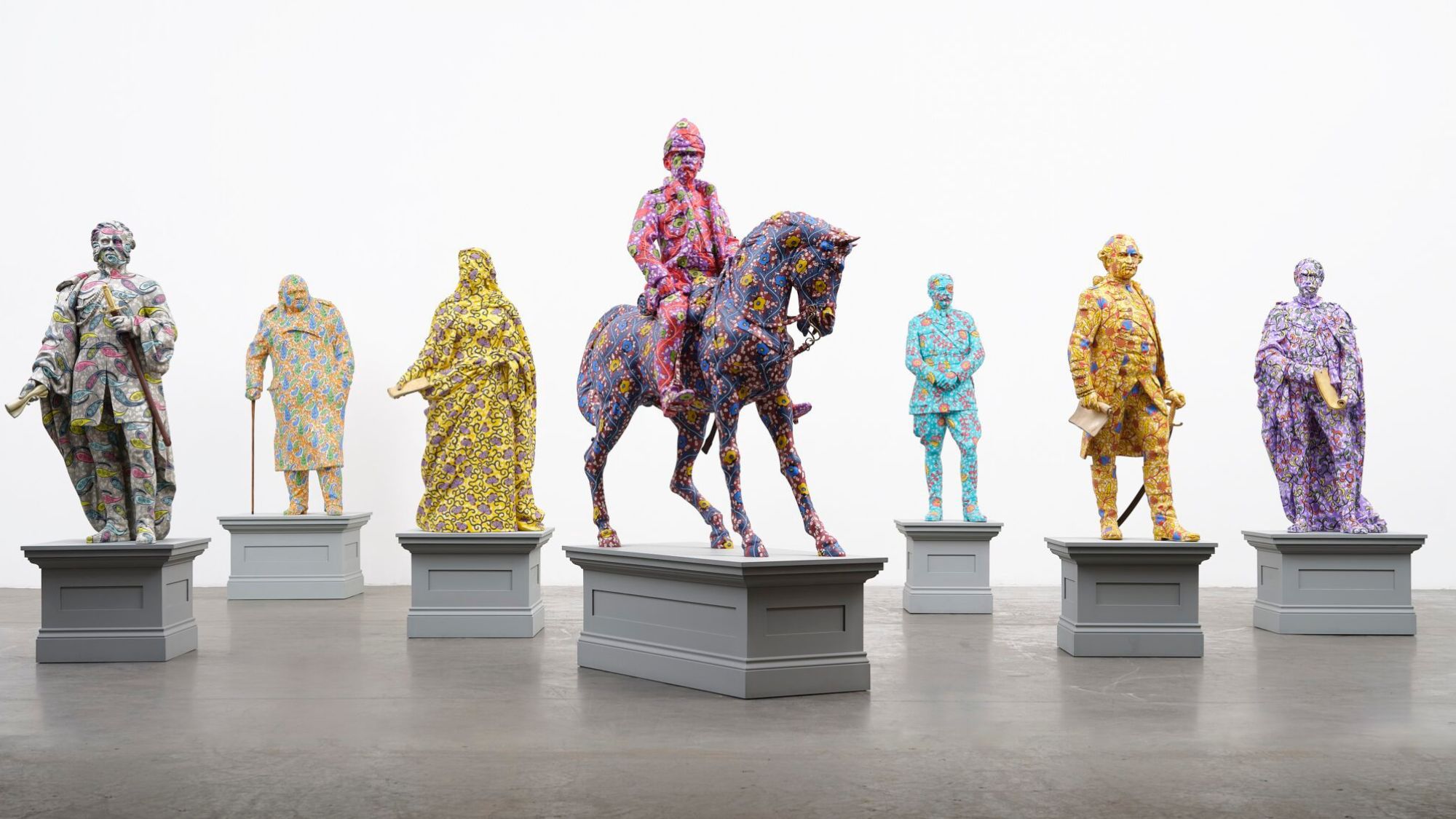Yinka Shonibare CBE: Suspended States – a 'stunning' show
Serpentine Gallery exhibition touches upon slavery, colonialism and global warming

A free daily email with the biggest news stories of the day – and the best features from TheWeek.com
You are now subscribed
Your newsletter sign-up was successful
In the 1990s, the British-Nigerian artist Yinka Shonibare had an "epiphany", said Ben Luke in the Evening Standard. He discovered that the colourful batik fabrics sold in Brixton Market, which he had always associated with West Africa, were in fact the product of complicated historical exchanges. They were based on Indonesian textiles shipped to Europe and thence "industrially produced" in Holland: they only arrived in Africa through colonial commerce.
Ever since, he has used this material to create work that explores the complexities of imperial history, and to question notions of "cultural authenticity". He has wrapped effigies of figures from British history in batik, and used the fabric to create "wind sculptures" – sails which evoke the principal motor of the slave trade. His trick, however, is to make it all look bright and joyous.
This new show at the Serpentine brings together a number of recent installations and sculptures, all using his "signature fabric". It touches on everything from slavery and colonialism to global warming and the refugee crisis.
The Week
Escape your echo chamber. Get the facts behind the news, plus analysis from multiple perspectives.

Sign up for The Week's Free Newsletters
From our morning news briefing to a weekly Good News Newsletter, get the best of The Week delivered directly to your inbox.
From our morning news briefing to a weekly Good News Newsletter, get the best of The Week delivered directly to your inbox.
It's "classic Yinka" – a show marrying "immediate visual allure" to "disquieting meaning". Shonibare's work is always "beautifully distinct", said Laura Cumming in The Observer. Even if he hasn't literally made these pieces himself (he has been disabled since adolescence), they are unmistakably his creations. It's a blessing and a curse, however. A work entitled "The War Library" sees 5,000-plus volumes on conflicts past and present bound in Shonibare's trademark textiles and exhibited in a huge bookshelf. "Stunning" as it is, he has made very similar pieces before. And it works in terms of rather obvious generalisations: the artist is "against colonialism, racism, imperialism, war". Elsewhere, he has made fibreglass copies of statues depicting figures from British imperial history, including Queen Victoria and Churchill, in his "gorgeously recognisable" batik patterns – again, a tactic he has deployed before. You're left feeling that he has been doing exactly the same thing for 30 years, and that "nothing – and I mean nothing – has changed".
Perhaps that's because it's still so relevant, said Jonathan Jones in The Guardian. By turning "patriotic statues" into objects that would be unimaginable to the people they commemorate, he has created "a witty, weirdly beautiful conclusion" to the furious debate around public sculpture that has raged since 2020. The conclusion to the show, "Sanctuary City", is especially "moving". Scale models of Aleppo Cathedral, the UN headquarters and the Bibby Stockholm barge, among others, are lit from within to reveal interiors patterned with his trademark fabrics. All these sanctuaries are at best ambiguous symbols – yet they "glow with the idea of protecting vulnerable people". We should be thankful for Shonibare – a gentle artist who "encourages us to think a bit".
Serpentine South Galley, London W2 (020-7402 6075 ). Until 1 September
A free daily email with the biggest news stories of the day – and the best features from TheWeek.com
-
 The environmental cost of GLP-1s
The environmental cost of GLP-1sThe explainer Producing the drugs is a dirty process
-
 Greenland’s capital becomes ground zero for the country’s diplomatic straits
Greenland’s capital becomes ground zero for the country’s diplomatic straitsIN THE SPOTLIGHT A flurry of new consular activity in Nuuk shows how important Greenland has become to Europeans’ anxiety about American imperialism
-
 ‘This is something that happens all too often’
‘This is something that happens all too often’Instant Opinion Opinion, comment and editorials of the day
-
 Arcadia: Tom Stoppard’s ‘masterpiece’ makes a ‘triumphant’ return
Arcadia: Tom Stoppard’s ‘masterpiece’ makes a ‘triumphant’ returnThe Week Recommends Carrie Cracknell’s revival at the Old Vic ‘grips like a thriller’
-
 My Father’s Shadow: a ‘magically nimble’ love letter to Lagos
My Father’s Shadow: a ‘magically nimble’ love letter to LagosThe Week Recommends Akinola Davies Jr’s touching and ‘tender’ tale of two brothers in 1990s Nigeria
-
 Send Help: Sam Raimi’s ‘compelling’ plane-crash survival thriller
Send Help: Sam Raimi’s ‘compelling’ plane-crash survival thrillerThe Week Recommends Rachel McAdams stars as an office worker who gets stranded on a desert island with her boss
-
 The 8 best superhero movies of all time
The 8 best superhero movies of all timethe week recommends A genre that now dominates studio filmmaking once struggled to get anyone to take it seriously
-
 Book reviews: ‘Hated by All the Right People: Tucker Carlson and the Unraveling of the Conservative Mind’ and ‘Football’
Book reviews: ‘Hated by All the Right People: Tucker Carlson and the Unraveling of the Conservative Mind’ and ‘Football’Feature A right-wing pundit’s transformations and a closer look at one of America’s favorite sports
-
 Catherine O'Hara: The madcap actress who sparkled on ‘SCTV’ and ‘Schitt’s Creek’
Catherine O'Hara: The madcap actress who sparkled on ‘SCTV’ and ‘Schitt’s Creek’Feature O'Hara cracked up audiences for more than 50 years
-
 6 gorgeous homes in warm climes
6 gorgeous homes in warm climesFeature Featuring a Spanish Revival in Tucson and Richard Neutra-designed modernist home in Los Angeles
-
 Touring the vineyards of southern Bolivia
Touring the vineyards of southern BoliviaThe Week Recommends Strongly reminiscent of Andalusia, these vineyards cut deep into the country’s southwest